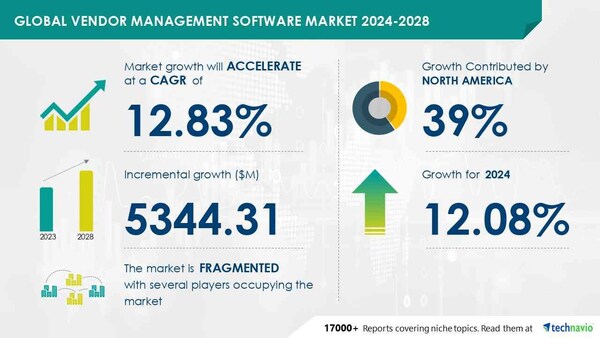NEWS PROVIDED BYTechnavio
May 15, 2024, 05:32 ET
NEW YORK, May 15, 2024 /PRNewswire/ — The global vendor management software market size is estimated to grow by USD 5344.31 mn from 2024-2028, according to Technavio. The market is estimated to grow at a CAGR of over 12.83% during the forecast period.
For more insights on the forecast market size and historic data (2018 – 2022) – Download Free sample report in a minutes

| Forecast period | 2024-2028 |
| Base Year | 2023 |
| Historic Data | 2018 – 2022 |
| Segment Covered | Type (Retail, BFSI, Manufacturing, and Healthcare and others), Deployment (On- premises and Cloud-based), and Geography (North America, APAC, Europe, South America, and Middle East and Africa) |
| Region Covered | North America, APAC, Europe, South America, and Middle East and Africa |
| Key companies profiled | 360factors Inc., Corcentric Inc., Coupa Software Inc., Deskera USA Inc., eSellerHub, Gatekeeper, HICX Solutions Ltd., Intelex Technologies ULC, International Business Machines Corp., Ivalua Inc., LogicGate Inc., LogicManager Inc., MasterControl Solutions Inc., MetricStream Inc., Proactis Holdings plc, Quantivate LLC, SalesWarp, SAP SE, Zoho Corp. Pvt. Ltd., and Zycus Inc. |
Key Market Trends Fueling Growth
Vendor Management Software (VMS) market growth is driven by demand for integrated solutions. VMS offers features like accounting, ERP, CRM, procurement, and contract management. Effective integration with other software, such as CRM, ERP, and contract life cycle management, is crucial for buying, selling, and contract processes. Key benefits include cost efficiency, performance management, risk management, regulatory compliance, and supply chain resilience. Industries like healthcare, IT, retail, and banking services adopt VMS for vendor selection, relationship management, and performance monitoring.
* Cloud computing’s pay-per-use model makes IT solutions more cost-effective for enterprises.
* Factors driving the adoption of cloud-based vendor management software include: easier implementation, less IT dependency, minimal hardware requirements, low maintenance costs, and no licensing fees.
* Cloud-based solutions enable businesses to focus on core competencies and offer advantages such as: minimal operational expenses, pay-as-you-go model, easy accessibility, reduced upfront costs, short processing time, complete scalability, and a low-risk business model.
* The growing acceptance of cloud-based vendor management software is due to its low upfront costs, flexibility to scale, and high speed of deployment.
* Some vendors providing cloud-based vendor management software are LogicManager.
* Cloud-based software can be accessed remotely through a web browser, reducing implementation time and improving ROI.
* Advantages of cloud-based vendor management software over traditional on-premises software include: lower costs, faster deployment, and increased flexibility.
* The increasing deployment of cloud-based vendor management software is expected to boost the global vendor management software market during the forecast period.
* Keywords: cloud computing, pay-per-use, vendor management software, implementation, IT solutions, in-house IT personnel, hardware infrastructure, maintenance costs, licensing costs, LogicManager, operational expenses, pay-as-you-go model, accessibility, upfront cost, processing time, scalability, low-risk business model, global vendor management software market.
Market Challenges
- The vendor management software market presents challenges for SMEs due to high implementation costs, which include design, customization, training, and maintenance. IT expertise is required for installation, and planning, funding, and managerial cooperation are essential. Post-implementation, software upgrades are necessary to address market trends and regulatory compliance. Key features include risk management, automation, contract management, performance metrics, and data security. Industries such as healthcare, IT, retail, and banking utilize this software for procurement, vendor information, and compliance management.
- On-premises vendor management software poses significant cost challenges for SMEs.
- Cost components include system design and customization, implementation, training, and maintenance.
- IT staff with relevant skillsets are required for implementation.
- Planning, funding, self-assessment, cooperation, and clear vision are essential for successful implementation.
- Employee training is necessary for efficient software usage.
- Regular upgrades are required to keep up with market trends, increasing overall cost.
- High implementation costs hinder vendor management software adoption among end-users.
- Impeded adoption negatively impacts the growth of the global vendor management software market during the forecast period.
Research report provides comprehensive data on impact of trend, driver and challenges – Buy Report
Segment Overview
This vendor management software market report extensively covers market segmentation by
- Type
- 1.1 Retail
- 1.2 BFSI
- 1.3 Manufacturing
- 1.4 Healthcare and others
- Deployment
- 2.1 On-premises
- 2.2 Cloud-based
- Geography
- 3.1 North America
- 3.2 APAC
- 3.3 Europe
- 3.4 South America
- 3.5 Middle East and Africa
1.1 Retail- Vendor Management Software (VMS) is a crucial tool in the retail sector, enabling compliance with regulations, performance management, and cost efficiency. Economic and non-economic factors drive the market’s growth, including business expansions, acquisitions, and consumption. VMS offers features like product benchmarking, vendor tracking, compliance management, and supplier relationship management. Performance monitoring, risk management, and regulatory compliance are essential aspects. SMEs and large enterprises alike benefit from VMS, addressing vendor selection, relationships, and contract management. Economic factors include economic instability and increasing competition, while non-economic factors include the need for supply chain resilience and automation processes. Implementation costs, legacy systems, data security, and privacy issues are challenges. Industries like healthcare, medical equipment, pharmaceuticals, IT and telecom, and technology products heavily utilize VMS, Vendor Procurement Software, Supplier Management Software, and Vendor Compliance Software.
For more information on market segmentation with geographical analysis including forecast (2024-2028) and historic data (2018 – 2022) – Download a Sample Report
Research Analysis
The Vendor Management Software (VMS) market encompasses solutions designed to streamline and optimize the relationship between businesses and their vendors. These systems offer features such as Supplier Management, Vendor Tracking, Vendor Compliance, Vendor Procurement, and Vendor Risk Management. SMEs benefit from cost efficiency and performance management through automated processes, reducing human error and enhancing supply chain resilience. VMS implementation can incur significant costs, but the return on investment includes effective Vendor selection, performance monitoring, and regulatory compliance. Challenges include data security and privacy issues, especially in industries like Healthcare, dealing with sensitive medical equipment and pharmaceutical data. Legacy systems integration and automation processes are also crucial considerations.
Market Research Overview
Vendor Management Software (VMS) is a crucial solution for procurement and supply chain teams in managing and optimizing relationships with suppliers. The VMS market is expanding, with features such as contract management, tracking, and analytics becoming increasingly important. Supplier relationship management is a key function, with risk management and performance metrics essential for effective vendor management. The software enables companies to streamline processes, reduce costs, and improve efficiency. Additionally, real-time visibility and communication facilitate better collaboration and issue resolution. The VMS market caters to various industries, including manufacturing, healthcare, and education, among others. Companies seek cost-effective and comprehensive solutions to manage their vendor relationships effectively. The market is competitive, with major players offering advanced features and integrations to attract customers.
Table of Contents:
1 Executive Summary
2 Market Landscape
3 Market Sizing
4 Historic Market Size
5 Five Forces Analysis
6 Market Segmentation
- Type
- Retail
- BFSI
- Manufacturing
- Healthcare And Others
- Deployment
- On-premises
- Cloud-based
- Geography
- North America
- APAC
- Europe
- South America
- Middle East And Africa
7 Customer Landscape
8 Geographic Landscape
9 Drivers, Challenges, and Trends
10 Company Landscape
11 Company Analysis
12 Appendix
About Technavio
Technavio is a leading global technology research and advisory company. Their research and analysis focuses on emerging market trends and provides actionable insights to help businesses identify market opportunities and develop effective strategies to optimize their market positions.
With over 500 specialized analysts, Technavio’s report library consists of more than 17,000 reports and counting, covering 800 technologies, spanning across 50 countries. Their client base consists of enterprises of all sizes, including more than 100 Fortune 500 companies. This growing client base relies on Technavio’s comprehensive coverage, extensive research, and actionable market insights to identify opportunities in existing and potential markets and assess their competitive positions within changing market scenarios.
Contacts
Technavio Research
Jesse Maida
Media & Marketing Executive
US: +1 844 364 1100
UK: +44 203 893 3200
Email: media@technavio.com
Website: www.technavio.com/
SOURCE Technavio

